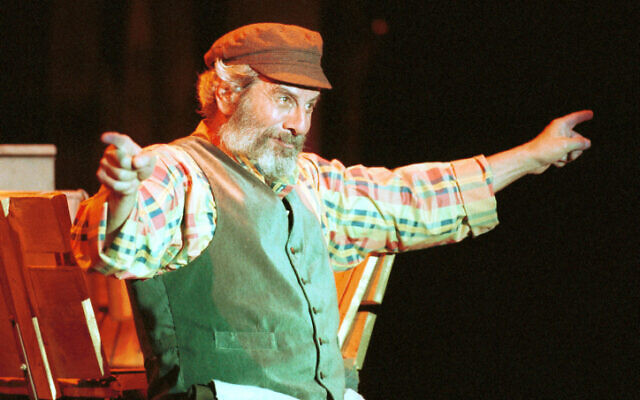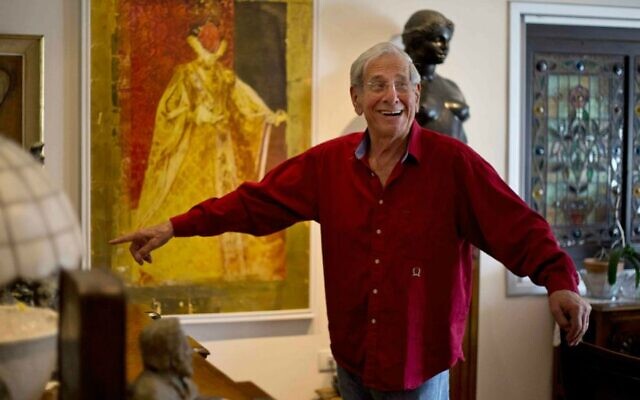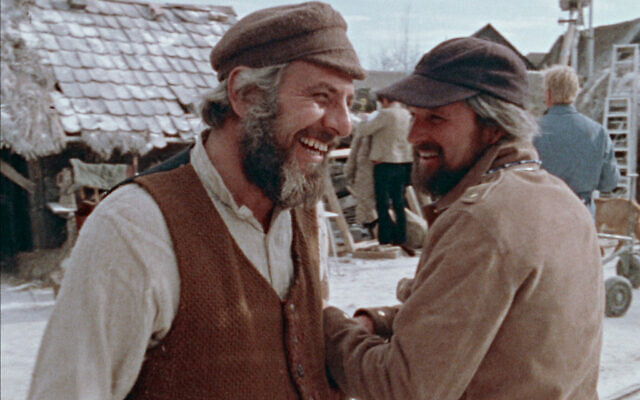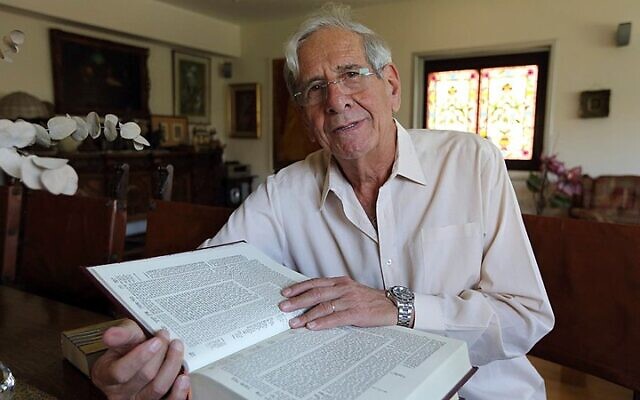Chaim Topol, iconic ‘Tevye’ of film and stage, dies at 87
Oscar-nominated actor, an Israel Prize laureate, gained global recognition for his role as the grumbling ‘Fiddler on the Roof’ milkman, whom he played over 3500 times on stage

Chaim Topol, the Israeli actor who found global fame for his role as Tevye in the film version of “Fiddler on the Roof,” died Thursday at the age of 87 in Tel Aviv after a multi-year battle with Alzheimer’s.
Topol, a prolific actor with a wide range of credits, was best known for inhabiting the central character of Tevye — first in stage productions of the famed Shalom Aleichem musical and then later in the iconic film, before eventually returning to the stage with the role.
Israeli President Isaac Herzog called Topol “one of the most outstanding Israeli stage artists,” who was a “giant of Israeli culture and will be greatly missed.” Prime Minister Benjamin Netanyahu called Topol a “multifaceted artist with great charisma and energy,” who “proudly represented Israel around the world.”
“Sadly, the fiddler on the roof is no longer with us,” Netanyahu added. “The strings of the fiddle have fallen silent. The story of Chaim Topol’s life has been sealed but I am certain that his contribution to Israeli culture will live on for generations.”
Israeli actress Rivka Michaeli, 84, who worked with the actor in the 1960s, said Topol was beloved “not just for being an international actor, but for his body of work” and his extensive philanthropic efforts, she told 103FM radio. “Topol was a man very much guided by his conscience; he was a man for whom Israel was his driving force — being Israeli was so important to him.”
Born in Tel Aviv in 1935, Topol began his acting career while completing his service in the army’s entertainment troupe where he met his wife, Galia. After his release, he joined a theatre group, appearing in multiple productions before his first film role, the 1961 drama “I Like Mike.”

But it was his 1964 role in the film “Sallah Shabati” that first gained Topol serious attention, both domestically and internationally. Topol played the title role in the now-iconic film about the hardships of a Mizrahi immigrant family living in a transit camp.
The film became a smash hit locally, won best foreign film at the Golden Globes and became Israel’s first-ever nomination for an Oscar in the international film category. A year later, Topol was cast in a small role in the 1966 big-budget US production “Cast a Giant Shadow.”
Shortly after that, he was brushing up on his English to audition for the part of Tevye in a British theatre production of “Fiddler on the Roof” – a role he had already been playing in Hebrew in Israel. Topol landed the part, premiering in the role in 1967 and ultimately playing several hundred shows as Tevye.
When director Norman Jewison was looking to cast Tevye for the film adaptation, he flew to the UK to watch Topol’s performance and was won over, casting him in what would become a critical and commercial success known around the world. The 1971 film adaptation was nominated for eight Academy Awards, including best actor for Topol, cementing him in the eyes of the world as the ultimate Tevye and as one of the first-ever Israeli actors to gain international recognition.
Over the years, Topol starred in several dozen more films in Israel and the US, including a role in the 1981 Bond film “For Your Eyes Only.” He also played scientist Galileo Galilei in the 1975 film “Galileo” in addition to appearing in the 1980 space opera film “Flash Gordon.”
He was always most closely identified as Tevye, though, returning to play the character on stage repeatedly around the world, including in a Broadway revival that earned him a Tony nomination.

He said goodbye to the character with a farewell tour across the US in 2009, revealing that he had acted as Tevye more than 3,500 times on stage. Topol began his career as Tevye at age 30, using makeup and costume to appear older, and wrapped up his time in the role when he was nearing 75, drawing on a seemingly endless well of vigour to appear younger.
“How many people are known for one part? How many people in my profession are known worldwide? So I am not complaining,” he said in 2015. “Sometimes I am surprised when I come to China or when I come to Tokyo or when I come to France or when I come wherever and the clerk at the immigration says ‘Topol, Topol, are you Topol?’ So yes, many people saw [Fiddler], and it is not a bad thing.”
In later years, Topol – who also wrote several books and illustrated several others – devoted himself to philanthropy, in particular as president of the Jordan River Village. The facility, which opened in 2012, runs a year-round camp in the Galilee for children living with chronic illnesses and disabilities.
Decades earlier, Topol founded the Variety Israel nonprofit, which provides treatment and support to children with special needs. In 2015, he was awarded the Israel Prize, considered the country’s top honour.

In an interview with Israeli public television at age 80, he boasted of having been able to maintain his busy pace, continuing to write, illustrate, make appearances and be involved in philanthropy.
“Sometimes I find myself doing even more than I ever did,” he said at the time. “I was always doing multiple things at a time… I guess it’s in my personality, and I enjoy it.”
He is survived by his wife of 67 years, Galia, along with his three children and several grandchildren.
TIMES OF ISRAEL

comments